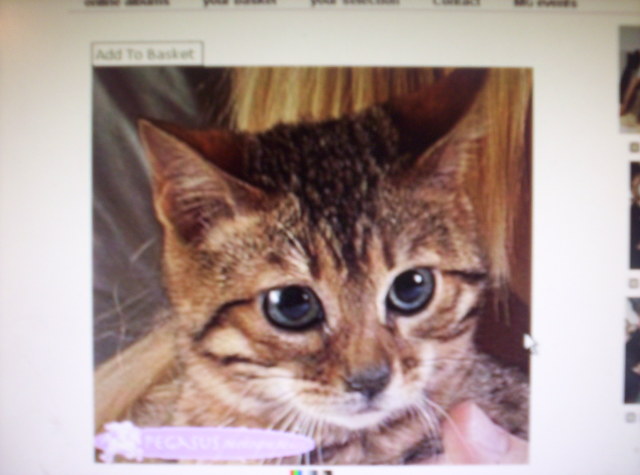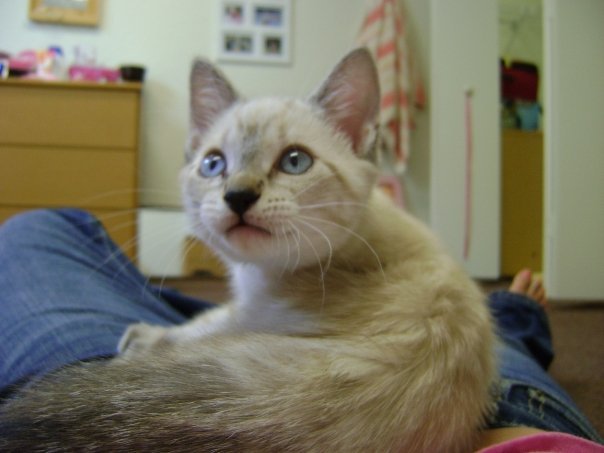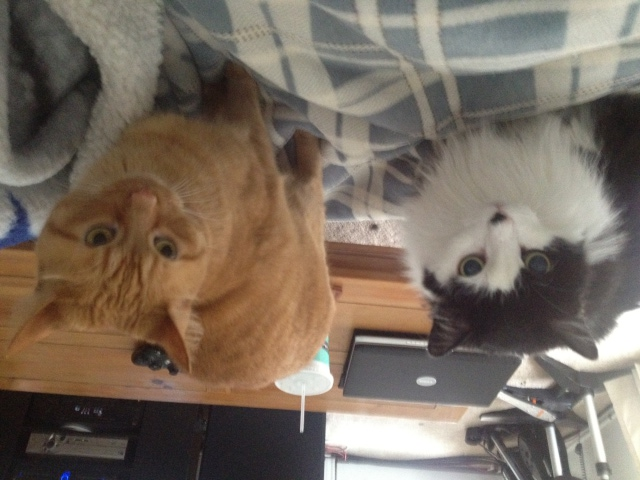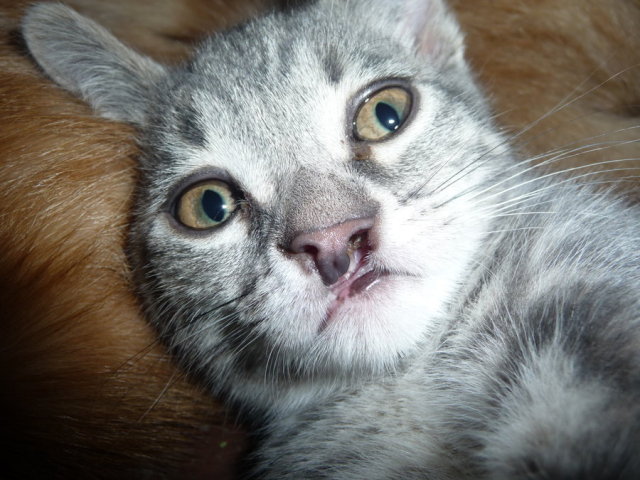QuestionQUESTION: I adopted yesterday a 1 month old kitten yes i know i made a mistake! i didn't realize he was that young untill i saw him.
He eats and drinks good and sleeps alot but he haven't been eliminating since i got him yesterday at 9 a clock at night and now its almost 9 in the morning. is that too long time without eliminating ? his stomach is full i just checked it.
I keep him very warm with blanket around him and a heater on close to him.
I put him in the litter box but he jumps out of it every time i put him there.
Please help me what should i do ?
Thanks
ANSWER: Zahra,
Congratulations on your new companion - it's unfortunate for him that his previous caregiver didn't understand his needs well enough to at least allow his mother to completely wean him before placing him in an adoptive home. It's possible that the reason your kitten isn't using the litter is because he's younger than he looks. Kittens around 3 weeks of age and younger aren't capable of eliminating on their own, their mother provides that stimulation by licking their bottom and genitals to stimulate elimination. If this is the case I'd suggest that you take your kitten, place him in his litter box and use an all natural, unscented baby wipe to gently wipe him from genitals to anus, he should urinate almost immediately, getting him to defecate will take a bit longer and it's important to be persistent and patient to get things happening. Your kitten's potty breaks will provide him with the information that he needs in order to eliminate in the right place when he's ready which is why you want him to be in the litter when you stimulate him to urinate and defecate, without stimulation a young kitten's bladder and bowels will eventually empty on an overflow basis which isn't healthy for the kitten. The litter box training should be something that catches on quite easily within the next week or so.
I'm surprised that this young kitten is eating and drinking well on his own, but since he is I'd recommend adding a commercially available weaning formula (KMR makes one) to supplement your kitten's diet so that he gets the extra nutrition he needs to continue developing at a normal rate. It's very important to make sure that the kitten doesn't get cold or overheated because either situation creates health risks for a young kitten since they aren't able to effectively maintain their own temperature. The blanket is perfect because it allows him to snuggle into something that can warm him if he's cold - that would normally be happening by the kittens in the litter sleeping piled on top of each other at this age, but the blanket is an acceptable substitute in a pinch. The room temperature should be comfortably warm by human standards, if it's excessive you may risk overheating the kitten which could cause serious health problems requiring emergency treatment at a vet hospital.
I normally suggest that kittens be allowed to stay with their mother and litter mates until they're at least 10-12 weeks of age because their social, physical and psychological development is more normal when this happens. Unfortunately the person you adopted your kitten from wasn't aware of the dangers of taking such a young kitten from mom. Just because kittens are capable of eating solids doesn't mean they're completely weaned, in fact some queens continue to nurse their babies until 8 or 9 weeks of age one or more times daily. Weaning happens gradually and sometimes queens will allow their babies to have a comfort nurse before bed at 8-9 weeks old.
There are some behavioral and medical issues you may see because this kitten was separated from his mother so early and I thought it was important that you know what is expected of a kitten that's been weaned and separated from mom prematurely. Very young kittens can develop serious issues with low blood sugar, they need to be fed small, frequent meals supplemented with a weaning formula so that they can have the nutrition they need to grow, develop and maintain a healthy blood glucose level. If you work outside of the home it might be prudent to take your lunch breaks over the next several weeks to come home and feed this baby his lunch so that he doesn't get in trouble with his blood sugar. In the event that it's not possible for you to return home to feed the kitten over lunch it might be worth considering hiring a pet sitter to come in during lunch time to make sure this baby gets his meal, that way you can avoid coming home to a limp, unresponsive kitten in need of immediate medical treatment.
Kittens taken from their mother before a minimum of 8 weeks old can become very demanding in terms of seeking comfort and attention. It's not uncommon for such a kitten to cry until he's picked up, cling to his caregivers and attempt to nurse on finger tips, ears, lips, clothing, blankets, other pets and stuffed animals. It's somewhat equivalent to an insecure child sucking their thumb and if this comes up it's not something that can usually be permanently stopped. Over the years I've found that I can redirect a kitten who wants to nurse so that he nurses on something acceptable to me and safe for him, but I've never been able to completely prevent the behavior. I would strongly suggest not allowing your kitten to nurse on anything that may break down and end up in his digestive system or create health problems for himself or any other pets in your home. I can tell you from experience that while young kittens taken from their mom too early may seem cute when they start sucking on a finger, ear lobe, lip, or other human body part it's not likely to be something that you'll want to deal with when the kitten's full grown, weighs 10-15 lbs and has a full set of teeth so bear that in mind when you're deciding what you want to allow your kitten to nurse on if this issue comes up.
You will also want to talk with your veterinarian about getting this kitten vaccinated at the appropriate time, orphaned kittens often need their shots earlier than kittens who have stayed with mom and been allowed to nurse until she weaned them. Young kittens are vulnerable to viral and bacterial infections so it's important that you keep him separated from other pets in your home and make sure that anyone handling him washes their hands in hot, soapy water before they touch him, clean his litter or prepare his food. Having the kitten treated for internal parasites as soon as possible is also important because most kittens are born with them and parasites can cause serious medical problems such as anemia or make it difficult for the kitten to gain weight in kittens who haven't had the advantage of staying with mom until she weaned them.
Spaying or neutering your kitten is also important once s/he's reached the appropriate age because you want to avoid medical and behavioral issues that can develop as a result of sexual maturity and the hormones that go along with it, you also want to avoid the possibility that your kitten will contribute to an already serious pet overpopulation problem that leads to countless healthy, adoptable cats and kittens being destroyed in shelters worldwide simply because there aren't enough good, adoptive homes available for all of them.
I also feel strongly that pet parents should be aware that declawing a cat isn't necessary to avoid having shredded furniture. Cats are smart, trainable and they'll use good quality, sturdy scratch posts/pads and cat trees rather than furniture if they're trained to do so. If the cat still feels the need to "sharpen" (cats don't actually sharpen their claws, they are scent marking and stretching their muscles) then you can use humane tools to modify the behavior and/or prevent damage to your furniture or carpets. I use Soft Paws/Claws when cats are persistent about wanting to exercise their claws on my furniture, these are soft vinyl caps that fit over a cat's nails preventing them from damaging furniture or carpets, they're applied by gluing them in place - it's somewhat similar to applying artificial fingernails. You can also use Sticky Paws which is a medical grade, non-toxic double sided tape that's safe to apply to most furniture and carpets. Cats don't like having anything stick to their paws so most get the hint quite quickly.
If your cat is fairly good about not scratching furniture or carpeting but he does so on occasion you can use humane disciplinary tools like a water pistol/squirt bottle or a can of compressed air (the type used to clean keyboards and electronics). It's very important that you don't recycle spray bottles from cleaning supplies or other chemicals if you want to use water to get your point across to your kitty because these things are toxic to cats - I usually buy my spray bottles at the dollar store, they're sold to use when misting tropical plants. If you squirt your cat with water most cats will be offended, stop behaving badly and head over to a corner to dry themselves and get their fur back in place. Some cats really do think that being squirted with water is a game, if this happens you can move on to the can of compressed air. In the event that you use compressed air it's important that you never tilt the can on an angle or aim directly at the cat because these products contain chemicals that can cause frost bite. Canned compressed air should be used by aiming in the general direction of the cat and pulling the trigger to get a short blast of air - the hissing lets the cat understand what you're saying immediately. The earlier you start the training the more successful it will be.
Contrary to popular belief declawing a cat isn't just a short, permanent nail trim. Declawing is a painful surgery involving the amputation of the cat's nails, tendons, ligaments and bone up to the first joint, the human equivalent would be amputating our fingers at the first joint. This surgery can result in ongoing pain for the cat because the surgery wasn't done properly or the cat has changed the way that he walks in order to alleviate as much pain as possible. Normal, healthy cats walk on their toes, many declawed cats walk on the backs of their feet which causes damage to ligaments, tendons and other soft tissue.
Declawing a cat can lead to serious behavioral problems such as biting which is probably related to the fact that the primary defenses aren't available to the cat any longer. Litter box avoidance also happens quite commonly in declawed cats shortly after surgery because the cat is in pain after surgery and he associates his pain with the litter box so he looks for alternate places to relieve himself. In the longer term declawed cats can continue to experience pain in their paws, this may be somewhat similar to phantom limb type pains that people have when they lose a limb. Having a cat declawed has serious risks of bleeding, pain and infection, which is why I don't suggest that any pet parent have this surgery done unless it's medically necessary.
---------- FOLLOW-UP ----------
QUESTION: Thank you so much for your response i really appreciate that, he finally eliminated several times but he doesn't respond fast to the stimulation, and i read somewhere else it's not good to overstimulate since it's a very sensitive area he will eliminate much after the stimulation is that normal ? and how many time should he eliminate if he eats and drinks often. His appetite is very good he eats and drinks alot and i'm also bottlefeeding him KMR formula.
I have another cat that is 1.5 years. we are not letting them play with eachother because we are afraid that the older cat will be aggressive with him and maybe injure him. How do older cat's deal with younger kitten about a month old ? The older cat sits in the carrier that was originally his but the younger kitten is using to sleep in it now. Is it good that we are not letting them play with each other ?
I will never declaw my cats its very cruel you are right and i hope more people will realize that. Cats can be trained they are smarter than we think. I have even a parrot an african grey and we have trained our older cat to not get close to him and we keep an eye on them when they are in same room it wasn't necessary to declaw him Cats understand when they are not suppose to do something. I really hope it will be illegal to declaw cats!
ANSWER: Zahra,
Provided that you use a clean cotton ball or natural, unscented baby wipe each time, pay close attention to not using excessive force and wipe from genitals to bottom you shouldn't have any issues with irritating the kitten's anus or genitals. After all you have to consider that cotton balls or baby wipes are far softer than mom's tongue which is what she uses to stimulate her kittens to eliminate. Given your description of what's been happening I suspect that this kitten's fairly young, it's not uncommon for kittens who are still dependant upon ano-genital stimulation to eliminate to be a bit slow to respond to human caregivers providing that stimulation, after all, we're pretty poor substitutes when compared to your average feline mom.
You'll want to stimulate your kitten to eliminate when he wakes from naps and after meals. I normally find that making sure the urine/feces your kitten eliminates ends up in his litter pan so that he associates it with using the toilet and the scent of his own waste is there to help him understand where to eliminate in the right spot contributes to faster potty training when the kitten is able to eliminate voluntarily. It's probably wise to have the kitten examined by a vet just to ensure that he's continuing to develop normally - the vet will also be able to provide you with a general idea of when the kitten should be ready to start going to the bathroom on his own. Another important thing to do is to check the kitten's bedding each time you bring him out of the kennel because the fact that he's so small means he may be eliminating in one corner and able to get far enough away from it that he doesn't mind.
At this stage of your new kitten's development he's still way too young to be exposed to other cats. Kittens aren't born with much resistance to viral or bacterial infections which means that an infection that would have minimal effects on your older cat could cause the kitten to become quite sick. There's also the added concern due to the fact that you have an older male cat, especially if he's not neutered because tom cats will kill young kittens in an attempt to bring mom back into season more quickly so that they can mate with her and father more kittens. Even neutered older cats can react poorly to new kittens in their territory so at this point it's best to keep the kittens separate.
You can rub the kitten down with a clean facecloth, then rub your older cat down with the same facecloth and go back to the kitten and rub him down again. This allows the older cat and this tiny kitten to become accustomed to each other's scents which will minimize the risk of territorial aggression between the two when they meet, doing this 1-3 times a day til the kitten is old enough to meet his older brother is perfectly reasonable. I would say that the kitten shouldn't be around your older cat until he's at least 10 weeks old, vaccinated, dewormed and given a clean bill of health, this is as much for your older cat's protection as it is for the kitten's wellbeing because you may not know the history of this baby's mom and whether or not she was coming down with anything contagious. The quarantine period will be the safest way to keep everyone healthy.
To be completely honest I see no need for cats to be declawed, they're very trainable and unless there's a serious medical reason (such as rubber kitten syndrome) for the cat not to have their claws they should be allowed to keep them. Overall I think that too many pet parents are convinced that declawing has to be done because vets sometimes include it as a routine part of kitten wellness programs, it's a procedure that takes 5-10 minutes to complete and costs 150-500+ dollars - that's why I stay away from vets more consumed with the almighty dollar than the wellbeing of my cats.
---------- FOLLOW-UP ----------
QUESTION: I'm sorry about writing again I'm extremely worried about the kitten. we are going to the vet tomorrow so he can get the shots he needs and dewormed.
But do you think we should try giving him back to the people we got him from because it's too risky for his life that we are taking care of him instead of the mom ?
or do you think he is fine with us and will survive it, i don't work and I'm doing everything i can, to be there for him, since i got him i haven't gone out to make sure he is fine eats drinks sleeps etc.. ?
He eliminated today only once is that enough for one day ?
He sneezed 3 times today on different occasions. is that very bad sign ?
AnswerZahra,
Unfortunately the damage has already been done with regards to this kitten being so young when he was taken from mom. At this point giving him back to mom isn't likely to work due to the fact that she'll lose her maternal instincts for the kittens after a couple of days and she won't care for him if that happens. As of now your care is what's keeping this kitten alive - I do think that speaking to the person who felt the need to adopt your kitten out at such a young age and letting them know just how inappropriate and dangerous their actions were is something to consider. The sad fact remains that this person isn't likely to stop giving such young kittens away without the authorities getting involved - I would recommend that you speak to the veterinarian about giving an accurate guess at this baby's age and whether or not this should be forwarded to the animal cruelty investigative team in your area. I don't agree with what this person's doing, it's a gamble, kittens this young should still be with mom, they're reasonably likely to survive, but it doesn't mean that there won't be serious consequences to this person's actions at some point. I really think that it's important to discuss the problems with this kitten being able to eliminate, it doesn't sound like he's getting what he needs to do this on his own and that's something the vet can help you with. I suspect that the kitten might be a bit young to get dewormed or vaccinated, but that depends upon the vet's individual preferences. Kittens do sneeze on occasion like we do, but I'd suggest that you make a point of mentioning this kitten's sneezing so s/he can check to make sure that this baby doesn't have a viral or bacterial infection of some sort. The vet may give you a liquid antibiotic to give this kitten if it's necessary, if so I'd suggest that you pick up some plain, full fat, unsweetened, organic yogurt and add a teaspoon or so to each bottle to reduce the likelihood that the kitten will develop a severe case of diarrhea. Antibiotics are wonderful, but there's one key issue with them which might prove dangerous to such a young kitten - they kill off the bad bacteria in our systems which is what we want them to do, BUT they also kill off the friendly bacteria within the digestive tract which can result in some pretty serious diarrhea. In a kitten this young a serious case of diarrhea could make him seriously sick or cause his death.

 tatty kitten
QuestionQUESTION: Hi i have adopted a bengal kitt
tatty kitten
QuestionQUESTION: Hi i have adopted a bengal kitt
 What kind of cat do i have?
Question
Chula
Ive been trying to figure out wha
What kind of cat do i have?
Question
Chula
Ive been trying to figure out wha
 Cat peeing on floor after other cat died
Question
My babies
I have a 6 year old tabby (my
Cat peeing on floor after other cat died
Question
My babies
I have a 6 year old tabby (my
 Cleft Lip
Question
Cleft Lip Kitty
Hi Ali,
I have a cat thats 11
Cleft Lip
Question
Cleft Lip Kitty
Hi Ali,
I have a cat thats 11
 my pregnant cat has given birth to one dead kitten
Question
l
my cat has been nesting for last 2 days, whe
my pregnant cat has given birth to one dead kitten
Question
l
my cat has been nesting for last 2 days, whe